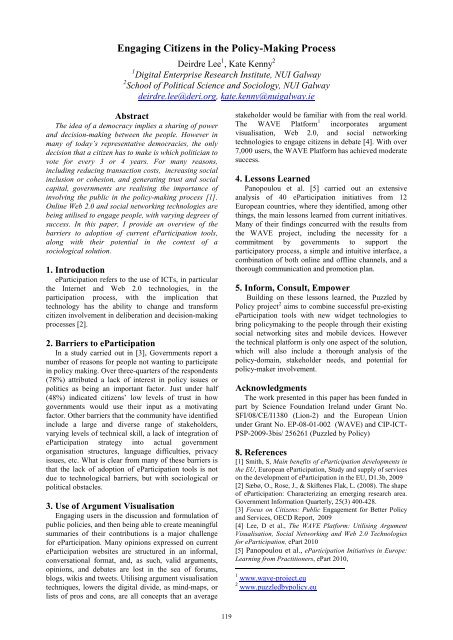NUI Galway – UL Alliance First Annual ENGINEERING AND - ARAN ...
NUI Galway – UL Alliance First Annual ENGINEERING AND - ARAN ...
NUI Galway – UL Alliance First Annual ENGINEERING AND - ARAN ...
You also want an ePaper? Increase the reach of your titles
YUMPU automatically turns print PDFs into web optimized ePapers that Google loves.
Engaging Citizens in the Policy-Making Process<br />
Deirdre Lee 1 , Kate Kenny 2<br />
1 Digital Enterprise Research Institute, <strong>NUI</strong> <strong>Galway</strong><br />
2 School of Political Science and Sociology, <strong>NUI</strong> <strong>Galway</strong><br />
deirdre.lee@deri.org, kate.kenny@nuigalway.ie<br />
Abstract<br />
The idea of a democracy implies a sharing of power<br />
and decision-making between the people. However in<br />
many of today’s representative democracies, the only<br />
decision that a citizen has to make is which politician to<br />
vote for every 3 or 4 years. For many reasons,<br />
including reducing transaction costs, increasing social<br />
inclusion or cohesion, and generating trust and social<br />
capital, governments are realising the importance of<br />
involving the public in the policy-making process [1].<br />
Online Web 2.0 and social networking technologies are<br />
being utilised to engage people, with varying degrees of<br />
success. In this paper, I provide an overview of the<br />
barriers to adoption of current eParticipation tools,<br />
along with their potential in the context of a<br />
sociological solution.<br />
1. Introduction<br />
eParticipation refers to the use of ICTs, in particular<br />
the Internet and Web 2.0 technologies, in the<br />
participation process, with the implication that<br />
technology has the ability to change and transform<br />
citizen involvement in deliberation and decision-making<br />
processes [2].<br />
2. Barriers to eParticipation<br />
In a study carried out in [3], Governments report a<br />
number of reasons for people not wanting to participate<br />
in policy making. Over three-quarters of the respondents<br />
(78%) attributed a lack of interest in policy issues or<br />
politics as being an important factor. Just under half<br />
(48%) indicated citizens’ low levels of trust in how<br />
governments would use their input as a motivating<br />
factor. Other barriers that the community have identified<br />
include a large and diverse range of stakeholders,<br />
varying levels of technical skill, a lack of integration of<br />
eParticipation strategy into actual government<br />
organisation structures, language difficulties, privacy<br />
issues, etc. What is clear from many of these barriers is<br />
that the lack of adoption of eParticipation tools is not<br />
due to technological barriers, but with sociological or<br />
political obstacles.<br />
3. Use of Argument Visualisation<br />
Engaging users in the discussion and formulation of<br />
public policies, and then being able to create meaningful<br />
summaries of their contributions is a major challenge<br />
for eParticipation. Many opinions expressed on current<br />
eParticipation websites are structured in an informal,<br />
conversational format, and, as such, valid arguments,<br />
opinions, and debates are lost in the sea of forums,<br />
blogs, wikis and tweets. Utilising argument visualisation<br />
techniques, lowers the digital divide, as mind-maps, or<br />
lists of pros and cons, are all concepts that an average<br />
119<br />
stakeholder would be familiar with from the real world.<br />
The WAVE Platform 1<br />
incorporates argument<br />
visualisation, Web 2.0, and social networking<br />
technologies to engage citizens in debate [4]. With over<br />
7,000 users, the WAVE Platform has achieved moderate<br />
success.<br />
4. Lessons Learned<br />
Panopoulou et al. [5] carried out an extensive<br />
analysis of 40 eParticipation initiatives from 12<br />
European countries, where they identified, among other<br />
things, the main lessons learned from current initiatives.<br />
Many of their findings concurred with the results from<br />
the WAVE project, including the necessity for a<br />
commitment by governments to support the<br />
participatory process, a simple and intuitive interface, a<br />
combination of both online and offline channels, and a<br />
thorough communication and promotion plan.<br />
5. Inform, Consult, Empower<br />
Building on these lessons learned, the Puzzled by<br />
Policy project 2<br />
aims to combine successful pre-existing<br />
eParticipation tools with new widget technologies to<br />
bring policymaking to the people through their existing<br />
social networking sites and mobile devices. However<br />
the technical platform is only one aspect of the solution,<br />
which will also include a thorough analysis of the<br />
policy-domain, stakeholder needs, and potential for<br />
policy-maker involvement.<br />
Acknowledgments<br />
The work presented in this paper has been funded in<br />
part by Science Foundation Ireland under Grant No.<br />
SFI/08/CE/I1380 (Lion-2) and the European Union<br />
under Grant No. EP-08-01-002 (WAVE) and CIP-ICT-<br />
PSP-2009-3bis/ 256261 (Puzzled by Policy)<br />
8. References<br />
[1] Smith, S, Main benefits of eParticipation developments in<br />
the EU, European eParticipation, Study and supply of services<br />
on the development of eParticipation in the EU, D1.3b, 2009<br />
[2] Sæbø, O., Rose, J., & Skiftenes Flak, L. (2008). The shape<br />
of eParticipation: Characterizing an emerging research area.<br />
Government Information Quarterly, 25(3) 400-428.<br />
[3] Focus on Citizens: Public Engagement for Better Policy<br />
and Services, OECD Report, 2009<br />
[4] Lee, D et al., The WAVE Platform: Utilising Argument<br />
Visualisation, Social Networking and Web 2.0 Technologies<br />
for eParticipation, ePart 2010<br />
[5] Panopoulou et al., eParticipation Initiatives in Europe:<br />
Learning from Practitioners, ePart 2010,<br />
1 www.wave-project.eu<br />
2 www.puzzledbypolicy.eu
















